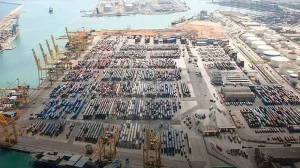Islamabad, Jan 16: The federal government has announced revised petroleum prices for the upcoming fortnight. According to the latest notification issued by the Ministry of Finance, petrol and high-speed diesel prices have both been increased, adding to the financial burden on consumers.
Starting January 16, 2025, the price of petrol has been increased by Rs. 3.47, taking it from Rs. 252.66 per liter to Rs. 256.13 per liter. Meanwhile, the cost of high-speed diesel has risen by Rs. 2.61, now priced at Rs. 260.95 per liter compared to the previous Rs. 258.34.
This adjustment follows the government’s earlier fortnightly review, where petrol prices saw a marginal increase of Rs. 0.56, and high-speed diesel surged by Rs. 2.96. Despite efforts to stabilize the economy, these recurring price hikes reflect the challenges posed by fluctuating international oil markets and the devaluation of the Pakistani rupee.
Read More: OGRA Announces New RLNG Prices for January 2025
The upward revision in fuel costs impacts not just the transportation sector but also inflation across essential commodities, as diesel is widely used in freight and agricultural machinery. Many are concerned that these price hikes could further strain household budgets, given the rising cost of living.
Experts attribute these price increases to global oil price trends and domestic economic policies. The government has reiterated its commitment to balancing economic stability with the interests of the general public. However, the frequent adjustments have sparked debate over the effectiveness of current fiscal measures in addressing economic woes.
In light of these changes, transportation costs are expected to rise, potentially leading to higher prices for goods and services. Citizens and businesses alike will need to adapt to the updated fuel rates, which remain a critical aspect of the country’s financial framework.
As the new rates take effect, stakeholders are urging the government to explore alternative energy sources and implement long-term strategies to mitigate the economic impact of petroleum price volatility.









